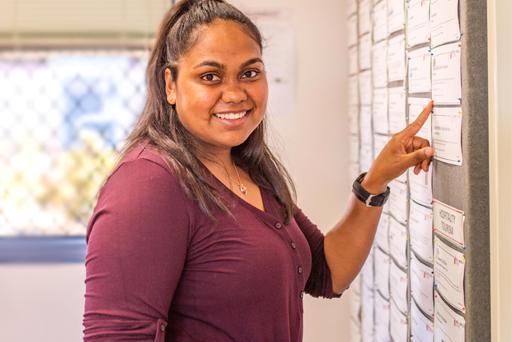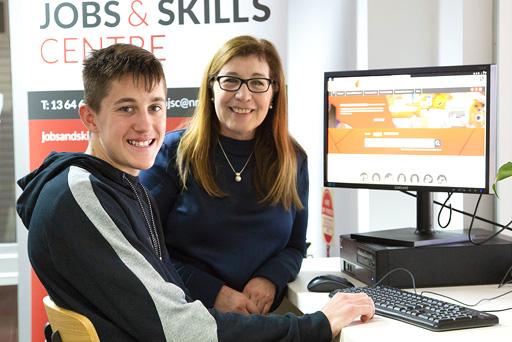Looking for a job? Wondering where all the jobs are? Maybe you have limited workplace experience but plenty of life skills and smarts, you're looking for a first job or career change, or finding it hard to get a job. Sometimes we all need a little help, and that's where we come in!
We can help with your job search, help you feel confident about applying for jobs, and give you options to upskill and get job ready. We also know what's happening in your local area, and where the jobs are. Follow the links to find out more.
- How we can help
- Free workshops for jobseekers
- Check out our free jobs board
- Deadly jobs for you and your mob
- What's happening in my region?
- How can I find out about different occupations?
- Know your skills and abilities
- Do I need to skill up?
- Fee-free and low fee training
- Employment pathways training programs
- Applying for jobs
- Get your application act together!
- Writing a winning CV or resumé
- Nailing that job interview
- Help to hang in there!
- Top tip! Using the STAR model for a winning application
- Top tip! Social media and your online self
- Top tip! Networking your way to success
- Top tip! What not to put on your resume
How we can help
There are 15 Jobs and Skills Centres (JSCs) located throughout Perth and in regional areas across WA that offer free help and support for your job search. Because JSCs work closely with their local community, and with local employers and businesses, they know where the jobs are and what's happening in your area.
Whether you're searching for a job, wanting to change careers, looking for an apprenticeship or traineeship or maybe just some advice about training or career planning, there's no better place to go than your local JSC.
Best of all, their services are free! Call your local JSC today on 13 64 64, or visit for a chat and find out how they can help you.
Free workshops for jobseekers
Sometimes all you need is some guidance and tips from the experts, to lift your job search to the next level and get that job. That's exactly what you'll get with the free workshops offered by Jobs and Skills Centres — they cover a range of topics including career planning, job searching, applying for jobs, resume writing, and job interviews.
Call your local JSC on 13 64 64 to find out what workshops are coming up and book your spot.
Deadly jobs for you and your mob
If you're an Aboriginal or Indigenous jobseeker, Jobs and Skills Centres provide a culturally safe space to explore your options and specialised support services to help you get that deadly job. This video features Nate, from the Rockingham JSC, who has many years of experience helping Aboriginal jobseekers and working with local employers to find jobs.
Find out more about our Aboriginal services here
You can also follow our Deadly Jobs Facebook page, to keep up with all the latest job information and opportunities: @Deadly.Jobs.JSWA.
Occupations and job roles
When looking for a job, it's helpful to know about different occupations and the kind of work they involve.
What will be a good fit with who you are and what you want for your future, and will you need new skills to get into a particular occupation or job?
To help answer these questions, we have over 550 occupation profiles you can browse through.
Visit our Occupation profiles page to explore occupations and careers
What's happening in my region?
Central Regional
Jobs and Skills Centres will be opening progressively in regional areas of Western Australia throughout 2018–19.
Specialist career, training and jobseeker support, as well as specialist services for Aboriginal people and employers, will continue to be available in the meantime through regional Career Centres and Aboriginal Workforce Development Centres.
To find out more about the services for regional areas, please visit the Career exploration page or the Aboriginal services page, or you can contact the regional service providers directly.
Contact information for regional Aboriginal Workforce Development Centres
North Metropolitan
North Regional
Jobs and Skills Centres will be opening progressively in regional areas of Western Australia throughout 2018–19.
Specialist career, training and jobseeker support, as well as specialist services for Aboriginal people and employers, will continue to be available in the meantime through regional Career Centres and Aboriginal Workforce Development Centres.
To find out more about the services for regional areas, please visit the Career exploration page or the Aboriginal services page, or you can contact the regional service providers directly.
Contact information for regional Aboriginal Workforce Development Centres
South Metropolitan
South Regional
Jobs and Skills Centres will be opening progressively in regional areas of Western Australia throughout 2018–19.
Specialist career, training and jobseeker support, as well as specialist services for Aboriginal people and employers, will continue to be available in the meantime through regional Career Centres and Aboriginal Workforce Development Centres.
To find out more about the services for regional areas, please visit the Career exploration page or the Aboriginal services page, or you can contact the regional service providers directly.
Contact information for regional Aboriginal Workforce Development Centres
Finding a job
In decades past, it was common for people to have one job (and even one employer) for life. Today, most of us can expect to have a range of different jobs in our lifetime and this may involve having several jobs at one time.
Your search for work will be made easier and more exciting if you don't think just about ‘getting a job for life’ but instead look at exploring a variety of work options.
Don't be daunted by the challenge of finding a job, once you have the right tips and tools you will feel more confident in yourself. After all, who wouldn't want to hire you — right?
Take a look at the following information to help with your job search.
There are many different places you can look for work, including:
- private and government run employment agencies;
- online jobs boards;
- newspapers; and
- social media such as Facebook and LinkedIn.
Knowing how employers recruit, and where to look for jobs, can give you a great head start as a jobseeker.
Take a look at our Job searching online fact sheet for some useful information
Employers use a wide range of recruitment methods to fill vacancies, so it is important that you adopt a variety of job search strategies to avoid missing any opportunities.
Over half of all vacancies are advertised on the Internet.
Employers also advertise using employment websites/their own company websites or in newspapers and increasingly jobs are being advertised on social media or mobile applications as a way of connecting with jobseekers. We recommend you follow the companies you're interested in, to make sure you're the first to know about any employment opportunities that come up.
You can also follow groups like "Perth Jobs" on Facebook, or specialist groups such as "aged care jobs Perth".
There are many websites available to you in your job search. You can even find jobs in other locations; regional, interstate or overseas. The process of applying can also be a lot easier. Some websites allow you to upload your resumé, copy and paste details from your resume, or you can use a resume builder that is embedded into the application system. Here's some of our recommended websites for online job searching.
- Jobs and Skills WA jobs board — Run by the Jobs and Skills Centres, this is a free online jobs board where you can search for current vacancies from local employers.
- Aboriginal services jobs board — The Jobs and Skills WA Aboriginal Services jobs board is a free online job search that has vacancies for Aboriginal jobseekers.
- Job Active — Search through jobs added daily.
- JobsWA — Employment opportunities with the WA government.
- Jobs hub — Find employers who are hiring and jobs in demand now
- Job Active — Connects job seekers with employers
- Australian jobs search— Australia’s free online jobs website
If there's somewhere you would love to work, or a type of work that you're particularly interested in — instead of waiting for a job to be advertised, get in there and find it first!
Many jobs are not actually advertised, instead they are filled from a waiting list or by someone who knows a person looking for work.
It does take some confidence to front up to a business and say you're looking for work, but once you've done it a couple of times it's not so scary. Treat it like a job interview — look your best, and be prepared with a copy of your CV or resumé to leave with them.
Do your homework first — find out who you should ask for, and know what kind of work the business does so that you can talk their language. Focus on the skills, knowledge and experience that you have to offer... and if you don't have a lot of any of those things, focus on your willingness to learn and positive attitude towards working.
Know your skills and abilities
To give yourself the best chance of finding a job, you'll need to know your skills and abilities and what you can offer an employer.
One of the most important things you must do before seeking work or looking at your work alternatives is to consider what skills and abilities you can bring to the workforce. Your skills and abilities are your most valuable assets! And it's not just the technical or job related skills — like knowing how to build a wall, drive a forklift or work a computer — it's also your employability skills that employers will be looking for.
Take a look at the following information to help you know your skills and abilities.
Identifying, listing and describing your skills and abilities requires a little time and patience. However, you should plan to invest the time needed because you'll be organised and prepared when it comes time to talk to a potential employer about what you can offer.
Think about all the skills and abilities that you have acquired through your lifetime, from a range of sources including your hobbies, sporting activities, school and other training, work, and interests.
Just starting out?
- Myfuture — Skills activity can help you to identify skills you may like using at work
- Job Jumpstart looks at new ways to explore careers and prepare for work
Experienced worker?
- Explore your skills and possible career pathways with the Job Outlook — Skills Match activity quiz
- Explore your work style and possible options with the Job Outlook — Career Quiz
Employability skills, (sometimes called transferable or soft skills) cover a broad range of personal attributes and transferable skills that are very important to employers. They include communication, digital literacy, critical thinking, creativity, and problem solving and presentation skills.
Employers may also place emphasis on attributes such as reliability, motivation, hard work, good personal presentation, and good communication and organisational skills.
In the future world of work, employability skills — how you function and operate as an employee — will become even more valuable and important. These resources can help.
Use these resources to help you plan, identify, and achieve your job search goals:
Do I need to skill up?
During your job search, you might discover that you don't have some of the skills or knowledge you need to get that job. If you need to skill up, there's plenty of options.
- You could do a full qualification, a short course, or even volunteer or get yourself some work experience so you can pick up new skills in a real workplace or business.
- An internship or cadetship is another excellent way to skill up, and an apprenticeship or traineeship combines paid work with on and off the job training.
Applying for a job
Once you find a job you’re interested in, it’s time to go after it! You need to read the advertisement carefully to determine what you need to do to apply, pay attention to the instructions for how to apply, the closing date, and what you need to include with your application.
This is the stage where you need to get everything together – you're ready to go out there and make it happen, so now's a good time to check that you have everything you need. It’s really important to read the ‘How to apply’ instructions very carefully.
If you don’t submit your application the way the advertisement asks you to, or you don’t include everything requested, your application might not be considered by the employer.
The following information will help you get that job application just right.
There are several different ways you might apply for a job. These include:
- via online applications/forms;
- by email;
- in person;
- by phone;
- by mail/letter; or
- via a website or social media.
You’ll need an email address to submit applications online or by email. After you’ve applied online, you'll usually receive a receipt or acknowledgement by email, telling you that your application has been received (check your junk mail folder!).
Be sure that your email address sounds professional – if not, set up a new one specifically for job applications.
Read the advertisement carefully and be sure to follow the instructions for application.
Always check what the closing date and time is, so you have plenty of time to complete your application and submit it. Never leave things until the last minute! Your internet might go down, your printer might not work, or you may lose track of time. Most employers won't accept late applications, no matter how good your excuse is.
The job advertisement usually states what to include with your application, such as a CV. One item you'll often see an application ask for is a cover letter. Your cover letter introduces you to the person reading your job application and provides a summary of the information in your written application.
A good cover letter should:
- be no longer than one page;
- be directed to a particular person, addressing them as Mr, Mrs or Ms;
- introduce yourself and provide your contact details;
- state the job you are applying for;
- clearly state the skills and experience you have that match those required by the job;
- encourage the employer to read your application; and
- end with a statement inviting the employer to respond – such as that you look forward to meeting them or attending an interview.
Selection criteria and work-related requirements describe the knowledge, skills and abilities a person needs for that job. ‘Selection criteria’ is the term most often used in adverts for government jobs, larger organisations or professional roles, whereas ‘work-related requirements’ is the term you’ll most likely see in non-government job adverts.
Some common examples of selection criteria include demonstrated capacity to communicate effectively, a proven ability to work as part of a team; and well developed customer service skills.
Responding to selection criteria
When a job application asks you to ‘respond to the selection criteria’ or ‘address the work related requirements’, it means that the employer wants you to describe how you meet the requirements of the job.
The best way to do this is with examples that show you’ve done what you say you can do – for example, how you worked as part of a team to solve a problem, how you used your communication skills to provide excellent customer service, or how you used your customer service skills to resolve a conflict.
In many job descriptions, the selection criteria are divided into 'essential' (must have) and 'desirable' (good to have). You must be able to demonstrate that you meet the essential requirements, and always try to respond to the desirable criteria where you can.
The STAR model
The STAR model is based around a four-step approach to describing your skills, knowledge and abilities in a way that demonstrates what you can do — based on actual experience.
t's a great approach to follow when writing your application, and it's easy to do – just come up with one short paragraph for each of the following.
- Situation — Outline a specific circumstance where you developed the particular experience or used the required skills or qualities. Set the context of the situation, tell the story.
- Task — What was happening? What was your role? What did you have to do?
- Action — What action(s) did you take? What did you do and how did you do it?
- Result — What were the results of what you did? What did you achieve?
It may take a bit of practice to get it right, but if you can learn to use the STAR model you will find it's a great way to demonstrate your actual skills and knowledge and it really can be quite easy to do.
Take a look the Top tips on this page to see the STAR model in action.
Often an employer will ask you to nominate a referee, or ask for a reference, as part of the application process.
Referees are people who can describe your skills and experience to a potential employer. It's good to list two referees – ideally one should be your current or most recent employer or manager, someone who can talk about your work related skills. The other can be anyone who would be able to give a positive account of you, such as a teacher, colleague or coach, but try to avoid using family members or mates.
Sometimes a referee might provide this information in a written document – this is called a reference.
If you're going to use someone as a referee, always ask them first — you want to be sure they're okay with doing it.
You should also check what they would say about you, for example; if someone asked them about your communication skills what would they say? Are they able to speak about you in a positive way that is likely to help you get the job? If not, ask someone else!
Before you send in your job application, take the time to proofread it carefully to make sure it doesn't contain any spelling mistakes or other errors.
If you can, ask a friend to also proofread it — sometimes you won't see the errors in your own work because you have looked at it so many times, so getting someone new to read it over is a good idea.
Get your application act together!
Now that you're feeling more clear and confident about your skills, you're ready to go out there and make it happen! So now's a good time to check that you have all of the documents that you're going to need. These may include your CV or resume, copies of certificates or qualifications, copies of references, and maybe a portfolio of your work.
Here's some useful advice about getting your application act together.
A CV ( Curriculum Vitae) is a description of everything you’ve done in your life so far that an employer might want to know about – like your education, awards, hobbies and employment history. It might be several pages long and is usually written in chronological order, starting with the most recent time and working back from there.
A resumé is similar to a CV but shorter. It is usually only one or two pages long and focuses on your most recent or relevant experiences.
Your CV or resumé can be simple, or you can use colour and fancy layouts to make it look more interesting – the most important thing is that it tells a story about you, and what you can offer an employer.
In Australia these two terms – CV and resumé – are often thought to mean the same thing. It should highlight your skills, knowledge and experience but keep it clear, brief and to the point — most employers will scan through it fairly quickly so using bullet points instead of long paragraphs is one good technique to use.
If you're not confident about writing a CV/resumé yourself, your local Jobs and Skills Centre can help.
Be sure to customise your CV or resumé to suit the job and/or kind of work that you're applying for, to make sure that your potential employer can see straight away how you would be a great match for the job.
A portfolio is like an album that visually demonstrates your work or learning experiences, and gives a potential employer physical proof of your skills and abilities.
They are often used when you apply for a job where the employer wants to be able to see what you can do – for example, art and design, photography, music or artwork (like the example pictured here, for a graphic designer/photographer)
Your portfolio could be in electronic format if this shows your work better. For example, if you're into software applications or website development, then being able to show those things via a website or somewhere online would be a great way to showcase your portfolio.
Your resumé should include at least two ways that employers can contact you; an email address and phone number are the best ones to provide.
Make sure your personal email address sounds professional and is appropriate to send to potential employers – if it isn't, use a free email service such as Gmail to set up a new email account specifically for job applications.
Also check that your voicemail message is appropriate for potential employers to hear – if not, record a new one!
Make copies of these to include with your job applications – never send or leave the originals, as you may not get them back. Potential employers may ask to see the originals at some point, so always keep those in a safe place. You may also have to provide proof of identity such as a drivers' licence or passport. Always read the job advertisement carefully and make sure you include anything that's asked for when you send your application in.
You’ll need to save or store all these documents so they’re safe and easy to find when you need them. If you have access to a computer, you might be able to save them in electronic format to a thumb drive or a cloud service. Otherwise you’ll need a filing system, or at least a box or folder to keep paper copies of them all.
Writing a winning CV or resumé
|
If you have tried to write your own CV or resumé and found it difficult... you're not alone! Many people feel this way, and unfortunately they end up with something that isn't going to help them get a job. Your local Jobs and Skills Centre team are experts in CVs and resumés, just like Rod here in this video. They know what employers are looking for. Call your local JSC on 13 64 64 to get some expert help... it's free! |
|
Nailing that job interview
Employers use interviews to meet the person behind the job application face to face, to confirm you really are as good as you say in your application, and determine if you will be a good fit for their organisation.
Interviews can take several formats including a one-on-one chat with the employer or the person doing the hiring, a panel interview where several people ask you a range of questions, or perhaps a role play where you have to demonstrate your ability to perform the skills required in the job such as answering the phone or dealing with a difficult client.
Job interviews don't have to be scary, if you're well prepared you'll do great.
Read the following information to help you nail that interview! The good news is, you already have their attention... otherwise, you wouldn't have been invited to an interview!
Sometimes you will receive a phone call to ask you to attend an interview — if that happens, be sure to speak clearly and confidently and remember to thank them for calling. Listen carefully and note down any important information.
It's always a good idea to ask if you need to take anything with you, such as examples of your work.
If you didn’t do any research about the company when you were writing your application, do it before the interview.
You need to go into an interview knowing as much as possible about the company and the job/role, because not only does that show the employer you're interested but also helps you show them you’re the most suitable candidate for the job.
Check their website, and if possible stop by and checkout the business premises before your interview.
- Check where you need to go and when, who to ask for when you get there, and what the dress code is.
- If you're driving, check your directions and where to park.
- If you're using public transport, check the timetable and leave yourself plenty of time to get there!
Review the advert, the job description, the selection criteria and your application so that you’ll be able to confidently talk about your strengths in relation to the role.
Think about any extra skills or experience you might have that could put you above other candidates, and be prepared to talk about these.
Be yourself.
Be polite and respectful but don’t be shy. Remember the interviewer needs to get to know you to be able to decide if you are suitable.
Be confident – you wouldn't have been asked to come in for an interview if they didn't already think you sounded like a good candidate for the job, so feel good about yourself.
If there's things you want to know about the job, or the company, it's good to ask but wait until the end of the interview for questions.
Hanging in there — Resilience and positivity
We understand that searching for a job can be tough, and it can take a toll on your confidence. Remember... there is a job out there for you, it just hasn't found you yet! Staying positive and being resilient is key to success, so you can keep moving forward and stay focused on your goals.
Staying positive throughout the ups and downs is easier said than done however, maintaining a positive attitude is extremely important both for your own sense of wellbeing and for the success of your job search. Resilience is all about being able to bounce back from negative experiences, and keep moving forward in a positive way. Here are some strategies that can really help you in both areas.
- Have realistic expectations of how long the search will take — you're probably not going to find a job right away, and that's OK.
- Be willing to learn from your experience — reflect on what happened, and think about how you can improve the outcome if it happens again.
- Maintaining a healthy balanced lifestyle — get plenty of sleep, eat well, and enjoy a bit of exercise to keep your mind and body happy.
- Get help and support when you need it — there's no shame in your game, we all need help and support sometimes.
- Get back up again after a knock back — remind yourself of all the good things you have to offer, and that you're worth the effort.
Feeling positive about yourself and the world around you makes a difference to the way other people see you, and the success of your job search.
If you are needing support or want to talk to someone who can help, check out the following websites.
- Beyond Blue provide information and support to help everyone in Australia achieve their best possible mental health, whatever their age and wherever they live.
- Headspace —Headspace Centres act as a one-stop-shop for young people who need help with mental health, physical health (including sexual health), alcohol and other drugs or work and study support.
- Health Direct — Free Australian health advice.
- Lifeline — A national charity providing all Australians experiencing a personal crisis with access to 24-hour crisis support and suicide prevention services.
- Healthy WA — Western Australian Department of Health.
Top tips!
Social media and your online self
Do you use social media, like Facebook or Instagram or TikTok?
Do you have an online presence, like an online blog?
Did you know that many employers do an internet search and look on social media to check out the people who apply for their jobs?
To see what a potential employer might find about you, do a search (eg via Google) on your name and see what comes up.
If you are on social media, it's a good idea to check your page/s and profile/s — and other people's photos and content where you might be tagged — just to check that everything's okay for a potential employer to see.
You might also want to consider making your social media content 'Friends only' so that it's not publicly viewable.
What to put on your resumé!
Watch this video from Indeed.com for some top tips about words to avoid and words to include when putting your resumé together.
The STAR model in action
It may take a bit of practice to get it right, but if you can learn to use the STAR model you will find it's a great way to demonstrate your actual skills and knowledge and it really can be quite easy to do. As an example, using the STAR model to answer a criteria such as "Demonstrated problem solving skills" might look something like this.
"When I was working as a sales assistant in a fashion store, we had a huge sale starting the next day. But at 5.30 pm the day before, none of the sale signs for the windows or in-store displays had arrived. (Situation)
I was responsible for doing all of the sale displays (Task) so I had to find a solution.
I ended up staying at work after the store closed and I made some signs on the computer and printed them out. Then I put them up all through the store, so that everything was ready for the next morning. (Action)
The windows and displays ended up looking great, and the sale the next day was a huge success". (Result)
Networking your way to success
The old saying "It's not what you know... it's who you know!" is very true when it comes to getting that job. Many job opportunities don't actually get advertised — they are filled by 'word of mouth' through someone knowing someone else who turned out to be perfect for the job. This is networking in action — it's about connecting with people who can support and assist you in your job search.
Networking isn't just for business people — do it with your mates, your family, the people at the corner store — let people know you're looking for a job, drop off copies of your resumé... you may be surprised to see what opportunities may come your way!

How we can help
Getting that job can take a bit of time and effort, but there's plenty of help available along the way. Take one step at a time – you can do it!
Get into your local Jobs and Skills Centre — they can help with your job search, writing job applications, and putting a winning CV or resumé together. Got an interview coming up? Your JSC can give you some tips and help get you prepared.
Because they work with employers and business in your local area, JSCs can also help you to find work experience if that's something you need.
And remember, all their services are free!










